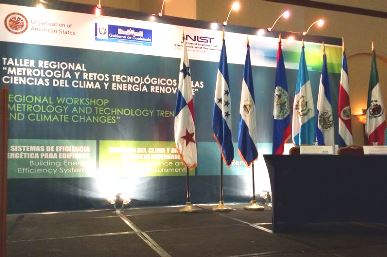
 This was the first in a series of technical workshops being held to build institutional capacity on this issue, as part of an initiative called Renewable Energy and Climate Science: Metrology and Technology Challenges in the Americas. The project is being implemented by the OAS Department of Sustainable Development and the U.S. National Institute of Standards and Technology (NIST) through ECPA, and covers all countries that belong to the Inter-American Metrology System (SIM).
This was the first in a series of technical workshops being held to build institutional capacity on this issue, as part of an initiative called Renewable Energy and Climate Science: Metrology and Technology Challenges in the Americas. The project is being implemented by the OAS Department of Sustainable Development and the U.S. National Institute of Standards and Technology (NIST) through ECPA, and covers all countries that belong to the Inter-American Metrology System (SIM).
In opening remarks at the workshop, OAS Project Coordinator Rubén Contreras emphasized the urgent need to establish policies and regulatory frameworks to encourage the standardized application of measurements in this field. “Metrology will play an extremely important role in the measurement of greenhouse gases,” he said.
For her part, the Deputy Minister for Investment and Competition in Guatemala’s National Economy Ministry, Claudia de Del Águila, talked about the importance of using the science of measurement as a basis for formulating appropriate policies and evaluating the impact of efforts to mitigate climate change. She stressed that workshops such as this one are critical for exchanging know-how among countries and developing strategic partnerships.
Other speakers at the opening of the workshop included Claire Saundry, Director of International and Academic Affairs for NIST; Guatemalan Congressman Emmanuel Seidner; and the National Representative of the OAS in Guatemala, Ambassador Milagros Martínez.
The workshop was geared toward the seven OAS member states that make up the SIM Central American subregion (CAMET). In addition to the host country, they are Belize, Costa Rica, El Salvador, Honduras, Nicaragua, and Panama. During the meeting, CAMET representatives agreed that while Central America has made a considerable effort to develop policies on renewable energy and climate change, all the elements for effective implementation are still not in place, which makes this ECPA initiative a valuable source of support in moving forward.
Participants also discussed the possibility of joining efforts on metrology issues, noting that this could produce a bigger impact in Central America’s small economies. Another challenge that came to light was the need to promote cooperation on training and institutional capacity-building in such areas as energy efficiency and the measurement of greenhouse gas emissions, given the countries’ major technical gaps in these areas.
At the end of the event, participants discussed specific training needs in each country, with a view to identifying opportunities for countries with more experience in each area to share their know-how through bilateral exchanges. For example, Mexico—which participated in the workshop as an invited expert—offered to share its knowledge on air-quality monitoring.
This initiative will strengthen and support SIM’s ongoing efforts to consolidate the measurement and standards infrastructure in the Americas, with a new focus on issues related to renewable energy and climate science. SIM is composed of national metrology organizations from 34 countries, which are organized into five subregions. The others, besides CAMET, cover the Andes (ANDIMET), the Caribbean (CARIMET), North America (NORAMET), and South America (SURAMET). Future technical workshops are expected to address needs in other parts of the hemisphere.
 View Map
View Map